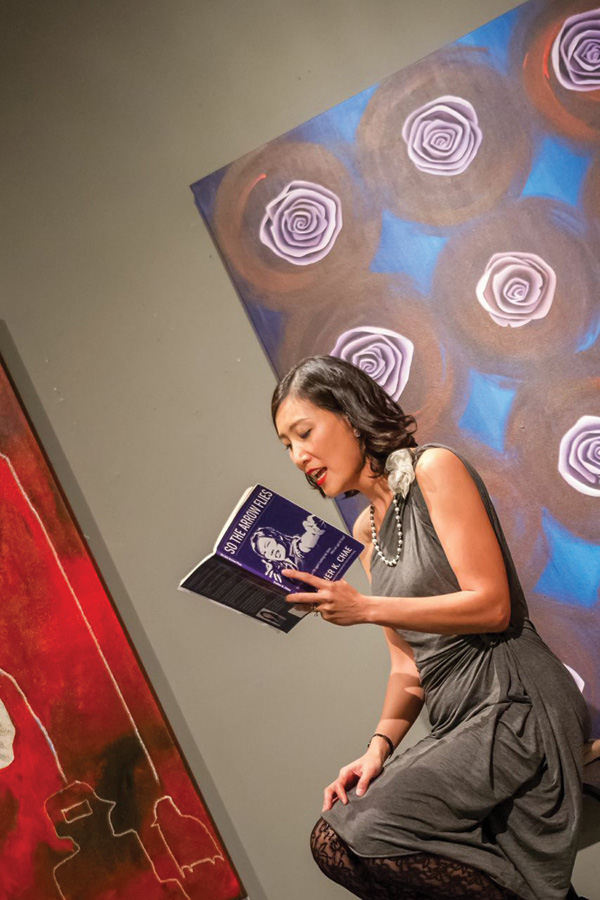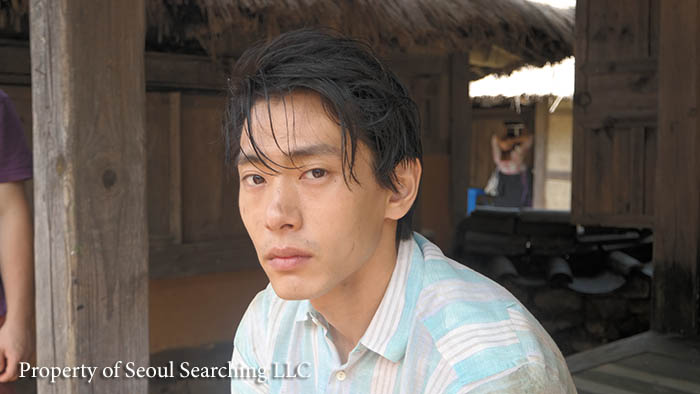by SARAH MIN
Hours before the first plane hit the Twin Towers on Sept. 11, 2001, Esther K. Chae boarded a Los Angeles-bound flight from New York. She was up in the air when news of the attack grounded her JetBlue aircraft in Kansas City. During those first uneasy hours, she and her fellow passengers watched as the towers billowed smoke from television screens, when a tall African American gentleman remarked, “Thank goodness the terrorists don’t look like us.”
“It was something that stuck with me,” says Chae in a recent video interview from her home in California.
“What if the terrorists had looked like me, if it was a Muslim Asian or somebody who was of Asian descent?”
For Chae, that question formed the basis for what would become her critically acclaimed solo performance, So the Arrow Flies, which was published as a stage play in August 2014, and which she has been developing and performing for the better part of the last decade.
So the Arrow Flies is a political thriller exploring the multiple layers of the Asian American identity through the eyes of four women, as it details the interactions between an alleged North Korean spy and the Korean American FBI agent who interrogates her. Chae, who conceived the play as a one-woman piece, plays all four characters: Catherine Park, the alleged spy; Ji-Young Park, the FBI agent; Mina White, Catherine’s American-born hapa daughter; and Mrs. Park, Ji-Young Park’s immigrant mother.
At the center of the interrogation is Catherine, a former North Korean actress and escapee turned FBI double agent, who changes names, faces and nationalities to conceal her identity. Chae, who came up with the character three years after that Sept. 11 midmorning flight, modeled Catherine after Katrina Leung, the real-life Chinese American informant recruited by the FBI, who in 2003 was accused of spying for China during a period of heightened concern over U.S. national security.
“She was this very schoolmarm-looking,unassuming woman who had worked for the FBI as an informant, who had two romantic relationships with two very high-profile people in the FBI, and who later turned out to be a spy,” says Chae, who first heard of Leung in a 2004 PBS Frontline documentary, From China with Love. “[I wondered], how did she get away with this?”
A federal judge would dismiss the charges against Leung—which consisted of illegally copying documents from her FBI handler-turned-lover—based on prosecutorial misconduct. But Chae took note of the investigation, believing Leung would be a fascinating figure to adapt into a character for a future stage play.
In an increasingly globalized world, Chae thought at the time, what might Katrina Leung’s story say about national identity? And what might it mean to be an Asian or Asian American accused of turning against the U.S. in a post-9/11 world?
These questions haunted Chae. In 2005, she wrote a 15-minute early iteration of her stage play for the Mark Taper Forum’s Solo Performance Workshop in Los Angeles, delving into what she imagined to be the psyche of Katrina Leung to create the Catherine Park character.
Chae also developed the characters of Agent Ji-young Park and Mina White at this time, but it wasn’t until a later personal experience that she added the witty and warm narrator, Mrs. Park.
In 2007, Chae’s mother contracted tuberculous meningitis and was in a coma while Chae served as her primary caretaker. The playwright returned to her short play and added the character of Mrs. Park as a dedication to her parents and the generation of immigrants they belonged to. “My world was so chaotic, I believe I needed to write poetically in order to give some sense and meaning to what was going on personally, along with world affairs,” she says.
The rest of the play quickly crystallized. To understand all four of her characters, Chae researched the concept of hamartia, a term associated with Greek tragedy that refers to a heroine’s tragic downfall. “It is a choice that one makes,” says Chae. “They think it’s out of their best judgment to make that choice. They tried their best at the time, but it became a flaw in the end.”
For the duration of the 85-minute run time for So the Arrow Flies, Chae slips in and out of generations, accents, postures and mindsets, without ever leaving the stage for a reprieve or a costume change. The unorthodox format caused one Edinburgh Festival Fringe reviewer to coin the word “polilogue” to describe the play as a “multi-polar performance that presents a discourse between different characters, but is expressed through the mouth and conduct of one solo actor.”
Chae, who has acted on such stages as the Arts Nova Theater Festival in New York and the October Nights Theater Festival in Italy, continues to perform her play based on invitation. Recently, the stage play was picked up for publication in Korea by Dong-In Book, and Chae hopes to get the play into the hands of students in America and Asia to use as study material.
The self-described “portfolio artist” was born in Eugene, Oregon, and moved to South Korea with her family at age 5. She has a degree in French literature from Korea University, an M.A. in theater studies from the University of Michigan and a Master of Fine Arts from the Yale School of Drama. Chae’s creative work has spanned across voice-over, television, stage and independent film. She has served as the keynote speaker for the Arts Council of Korea and performed an excerpt of So the Arrow Flies titled “One Actor. Four Women” at TED University (shorter-form talks within the conference series) in 2009.
On television, Chae has played a number of recurring and guest-starring roles on such shows as The Shield, Law and Order and E.R. Her work in NCIS as a North Korean operative reflects her gravitation to tales of espionage. However, it was partly her dissatisfaction with the roles available to her in Hollywood that led to So the Arrow Flies.
“I felt the need to form myself,” Chae explains. “My characters and ideas, I think I can safely say, are much larger and richer and more complicated than the roles that have been given to me.
“[My characters are] women of Asian descent with very varied backgrounds who have very complicated stories and personal histories that get unraveled as we journey along with them,” she adds.
The illustration on the recently published cover of So the Arrow Flies shows a young woman, one eye shut, her face bright with determination, as she motions to let loose an imaginary arrow. Arrows may seem out of place in a tale of modern espionage, but Chae connected the females in the play to ancient Korean gi-ma-jok, brave horse warriors who charge into battle with bows drawn.
“In a way, these characters are repetitions of the mistakes we’ve made as human beings throughout history,” she says. “They’re trying to survive in a situation that is larger than themselves.”
___
“So the Arrow Flies,” published by NoPassport Press, is available to order online at Amazon, Barnes & Noble and Lulu.
This article was published in the February/March 2015 issue of KoreAm. Subscribe today! To purchase a single issue copy of the February/March issue, click the “Buy Now” button below. (U.S. customers only. Expect delivery in 5-7 business days).








